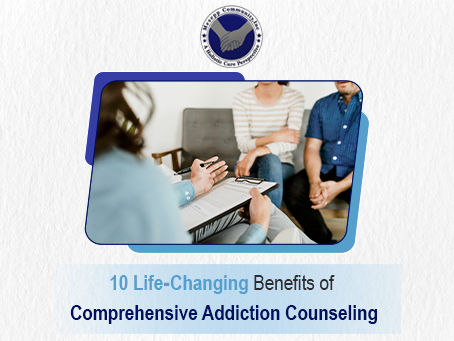10 Life Changing Benefits of Comprehensive Addiction Counseling
- Tonya London
- Aug 28
- 4 min read

If you are reading this, then the chances are that you or someone close to you is struggling with addiction, and you are asking yourself if counseling can really work.
The fact is that going through those initial steps of comprehensive addiction counseling is not only about attaining sobriety. It's about allowing yourself the opportunity to rebuild and redefine life.
Here's how comprehensive addiction counseling makes a real difference:
1. Breaking Through Denial and Building Awareness
Addiction is said to be insidious in that it becomes easy to downplay or overlook how it's working its way into every facet of your health, relationships, and future.
A good counsellor helps you:
Get the unhealthy patterns right without judgment
Untie action with emotion
Understand the addiction's actual impact on your days
2. Developing Healthy Coping Mechanisms
Many people resort to drugs to manage stress or negative feelings.
In the counseling process, you will start finding new and more healthy ways of coping with whatever life throws your way, including:
Easy stress-relieving strategies (breathwork or taking mindful walks)
Knowing how to handle daily occurrences without going back to previous habits
Learning to control your emotions so they do not take charge
Finding small physical outlets, like moving your body or spending time outside
Little by little, you'll find what actually works for you.
3. Healing Underlying Trauma and Mental Health Issues
Addiction is just one of many pieces of the puzzle for so many. Counseling helps you to gently uncover what's underneath.
A comprehensive clinical assessment can help your counselor:
Identify old wounds that may still be hurting you
Work through any existing anxiety, depression, or grief
Help you work through difficult feelings such as shame or regret
When you begin to heal from the inside out, recovery suddenly becomes a lot more doable.
4. Rebuilding Damaged Relationships
Counseling usually provides a way of repairing relationships and methods of communication, such as:
Open, calm dialogues with a loved one
True apologies when you're ready
Being clear about where you need to set healthier limits
Gradually, day by day, beginning to trust once more
Often, just the presence of that makes all the difference.
5. Creating a Structured Recovery Plan
Change is hard without a plan. A counselor can help you sort out your next steps and set up a plan that works for your actual life:
Finding a way to tweak your daily schedule to make room for staying sober
Finding goals at school, work, or in your hobbies that matter to you
Thinking through how you would handle any cravings or things that set you off
All of this feels easier when you've got something solid to hold onto.
6. Building a Strong Support Network
Your counseling experience can help you find or strengthen a support system, including:
Meeting people who will understand what you're going through
Finding mentors, sponsors or attending support groups
Building new friendships based on honesty instead of old habits
This network can really make a difference on tough days.
7. Improving Physical Health and Self-Care
It's not just about thinking or feeling, but your entire lifestyle. As you keep going, you will be reminded to take an interest in:
Meeting a healthcare provider to make sure that you are healthy
Learning what to eat and simple ways to increase your level of physical activity
Sleep habits that actually let you sleep
Finding your own way to relax and be kind to yourself
Gradually, both your body and mind can become strong.
8. Developing Life Skills and Independence
In some cases, addiction may even dominate life; hence, it becomes difficult to cope with day-to-day activities.
Counseling can help gently reteach skills that may have been forgotten along the way:
Making a budget and operating on a financial basis
Job hunting and interview preparation
Time management to make you feel you have your life together
Basic self-care and taking care of your space
These small wins really add up as your confidence grows.
9. Finding Purpose and Meaning
Getting your life back means you start to think about what gives you life again. In therapy, this means having time to:
Weigh out what is most important to you
A few good goals you might feel optimistic about
Consider how your path might benefit others
Envision, in even the smallest increment, a hopeful future for yourself
Having some sense of purpose makes everything else doable.
10. Preventing Relapse Through Long-Term Planning
Life isn't always easy, but therapy provides long-term help.
You work out things like:
Knowing early warning signs and what to do in high-risk times or situations
Reaching out for help before things get so bad
This way, you can keep going no matter how hard things get.
Next Steps
You can create a life that is good to live with the right support and honest guidance.
If you're ready, learn more about our comprehensive counseling services at MESEPP.
There's hope, and it's closer than you think.
FAQs
What are the stages of change in addiction counseling?
Precontemplation (not quite ready to change)
Contemplation (thinking it over)
Preparation (getting ready to take action)
Action (making the changes)
Maintenance (keeping it going)
Relapse (viewed as a learning step)
Precontemplation (not quite ready to change)
Contemplation (thinking it over)
Preparation (getting ready to take action)
Action (making the changes)
Maintenance (keeping it going)
Relapse (viewed as a learning step)
Which form of counseling has been shown to have the most benefit with addiction?
Cognitive Behavioral Therapy
Motivational Interviewing
A combination of approaches, tailored to each person's needs







Comments